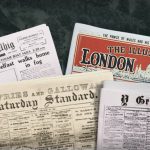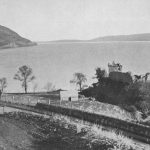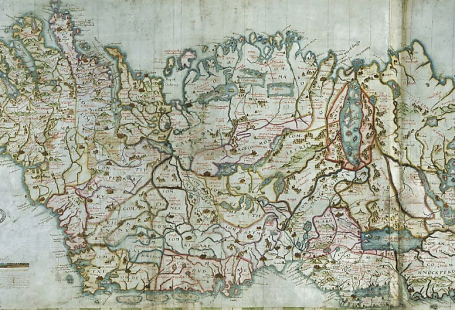As we move now into February we have been extremely busy here at The Archive, adding 139,438 brand new pages to our collection, with the addition of two brand new titles over the past seven days. Meanwhile, we have made significant updates to a range of our existing titles, with 26 titles updated in all.
So read on to discover more about our two new titles of the week, one of which represented the interests of the various Nonconformist Protestant groups of the nineteenth century, whilst the other represented the interests of an industrial town in Lancashire. Meanwhile, with Valentine’s Day fast approaching, we take a look at how the occasion was celebrated in Victorian Britain.
Register now and explore the Archive
The first of our two new titles of the week is the Nonconformist, which was first published on 14 April 1841 at the cost of six pence. Representing ‘the opinions of the Congregational and Free Churches,’ the Nonconformist was the voice of all those Protestant groups who did not conform to the governance of the established church, the Church of England. These groups included the Presbyterians, Congregationalists, Baptists, Brethren, Methodists and Quakers, who historically had been barred from participating in public life. However, as the nineteenth century progressed, such Nonconformists eventually gained greater freedoms, and their ideals were generally associated with those of hard work, frugality and temperance.

And so the Nonconformist advocated ‘the principles of ‘Free Churches in free states,’ opposing ‘the encroachment of Ritualism and Rationalism.’ Indeed, its very first edition stated how the newspaper aimed to:
…shew that a national establishment of religion is essentially vicious in its constitution, philosophically, politically, and religiously – to bring under public notice the innumerable evils of which it is the parent – to arouse men, and more especially those who avowedly and on religious grounds repudiate it, from the fatal apathy which they regard its continuance and extension.
The Liberal newspaper, therefore, set out to be an organ which represented ‘principles, not a class,’ setting itself ‘up to speak what is true, albeit not popular.’
Appearing every Saturday, the Nonconformist filled sixteen pages and covered ‘Ecclesiastical Affairs,’ looking at news from churches across the country, as well as containing ‘Religious Intelligence.’ The newspaper also had a broader focus, covering ‘General Politics’ from abroad, from the likes of Turkey, Egypt, and Spain, ‘Colonial’ news from Canada and Australia, as well as domestic and provincial news. Meanwhile, the Nonconformist contained such sections as ‘Selections from the Press,’ ‘Miscellaneous Intelligence,’ which looked at the latest from the assizes, ‘Literature,’ which reviewed the latest books, and ‘Trade and Commerce.’

In 1880 the newspaper changed its named to the Nonconformist and Independent, becoming in 1890 the Independent and Nonconformist, before finally being known as simply the Independent.
Our other new title of the week is the Bacup Times and Rossendale Advertiser, which was published in the Lancashire town of Bacup, which during the industrial revolution had become known for its mills. Established in 1865, and filling eight pages, the Bacup Times and Rossendale Advertiser appeared every Saturday, one of the town’s two market days, and cost just one penny. The newspaper circulated ‘through Bacup, Accrington, Newchurch, Haslingden, Waterfoot, Waterbarn, Millgate’ and other nearby towns and villages.
Printed and published by Thomas Leach from 36 King Street, the Bacup Times and Rossendale Advertiser was an eminently thorough local newspaper. Its first two pages were devoted to advertisements, public notices and wanted notices, also containing a railway timetable. The newspaper then moved on to look at ‘Local Intelligence’ from the likes of Crawshawbooth, the Lumb Valley, Rawtenstall, Shawforth, Todmorden and Waterfoot, reporting on the various deaths, accidents, manslaughters, fines, mill break downs, tea parties and sports matches which had taken place in the area.

Meanwhile, the Bacup Times and Rossendale Advertiser reported on the latest from the Rawtenstall Police Court and the Haslingden Board of Guardians, as well as the County Council Elections. Part of the newspaper was also devoted to poetry, whilst it included true crime serials like ‘A Race to Ruin,’ which chronicled the story of poisoner William Palmer (which you can read more about in our special blog here). Women readers of the newspaper were not neglected, moreover, with a special ‘Paragraph For Women’ being included, alongside a sketch of a female figure.
That’s it from our two new titles of the week, but we have updated many of our existing titles this week too. Of particular note are the updates we have made to two of our Norfolk titles, the Lynn Advertiser and the Diss Express, which total over 27,000 pages put together. We have also added 16,000 pages to the Irish Weekly and Ulster Examiner, which was the ‘Leading National Weekly Journal in Ulster,’ and was first published in 1891 in Belfast. Meanwhile, we have added over 5,000 new pages to a trio of titles, namely the Liverpool Journal of Commerce, the Coventry Standard and the Fulham Chronicle.
A Victorian Valentine’s Day
With Valentine’s Day approaching next week, using our new title the Nonconformist, we took a look at how Valentine’s was celebrated in the Victorian era.
An initial search revealed that poetry was both an important part of a Victorian Valentine’s day, and how the occasion gained popularity in the nineteenth century. Indeed, the Nonconformist in February 1873 attributes a French poem from 1801, entitled ‘Rousseau’s Dream,’ to the modern popularity of the festival, which marked the death of ‘the martyred prelate’ St Valentine on 14 February 269. This poem featured a serenade by a lover to his betrothed on St Valentine’s Day, although the newspaper remarked how ‘Poetical Valentines date back to a considerable period,’ the first believed to be from the pen of the Duke of Orleans (1394-1465), who was taken prisoner during the Battle of Agincourt in 1415.

The popularity of poetry on St Valentine’s Day endured throughout the century, the Nonconformist advertising ‘The Lover’s Own Valentine’ on 10 February 1875. This contained ‘Lyrics of Love,’ printed on ‘elegant’ cloth with ‘gilt edges,’ the perfect Valentine’s Day gift. Costing 3 shillings and 6 pence, it was described by the Westminster Review as a ‘most excellent collection.’

Meanwhile, in 1864 the Nonconformist advertised a different kind of gift, namely ‘Rimmel’s New Perfumed Valentines,’ which consisted of ‘St Valentine’s Gloves.’ The perfumer, founder of the famous cosmetics brand, also sold a ‘satchel’ for Valentine’s Day, which featured the ‘Language of Flowers, with quotations from Shakespeare and other poets,’ both gifts costing one shilling each.

And nowhere, at least according to the Nonconformist, was St Valentine’s Day more eagerly anticipated in the United Kingdom than in the city of Norwich. Here, as the newspaper relates on 15 February 1871:
The excitement reaches its climax on the 13th of February. The shops on this day are crowded. As the shades of evening begin to draw in, the fun commences. It does not do to delay the proceedings till a later hour, as the little ones will have gone to bed, and there will not be time to deliver all the packages and examine their contents.

The Nonconformist then goes on to give a vivid account of the 13th February in Norwich:
So about half-past six, as you walk through any street in Norwich, a strange, smart, decided series of knocks, such as you have not heard for twelve months, suddenly salute your ear, and you involuntarily exclaim, ‘There’s a Valentine!’ Now there are a great variety of knocks, but none like the Norwich Valentine knock. It is unique. You will know it as soon as you hear it…
And so, by this point, ‘In every household in the city expectation is now on tip-toe.’ A particularly special feature of this tradition is that everybody was involved, both young and old, and the giving of gifts on this day was not confined to an expression of romantic love, but love in general.

For example, the Nonconformist describes a household where a four-year-old Miss Juliette waits eagerly for her present, and she was rewarded with ‘an enormous package inscribed with her own name, and enclosing a lovely specimen of art in the shape of a young lady arrayed in full-dress costume.’ Her brother George, meanwhile, found ‘himself possessed of a wheelbarrow large enough to drive his sister round the garden,’ whilst their sister Jane received a bracelet, and the elder brother Tom a pipe. The servants in the household were not neglected either, each receiving ‘a brand new print dress.’
But from whom did these presents come? That was the mystery, the gift-givers not being identified. And the Norwich Valentine’s knocks continued until about 10pm, when ‘a considerable majority of inhabitants find that they have been the recipient of some little or substantial bounty.’

What Valentine’s traditions can you discover on The Archive? Begin your search here with us today, and don’t forget to let us know what you have found!
New Titles
Title | Years Added |
| Bacup Times and Rossendale Advertiser | 1889 |
| Nonconformist | 1841-1880 |
Updated Titles
This week we have updated 26 of our existing titles.
You can learn more about each of the titles we add to every week by clicking on their names. On each paper’s title page, you can read a FREE sample issue, learn more about our current holdings, and our plans for digitisation.
Title | Years Added |
| Airdrie & Coatbridge Advertiser | 1978 |
| Buckinghamshire Examiner | 1944, 1949 |
| Carmarthen Journal | 1847 |
| Coventry Standard | 1947, 1949, 1951-1952, 1954, 1956-1957, 1961, 1963-1964 |
| Daily Herald | 1960 |
| Diss Express | 1994-1998 |
| Evesham Journal | 1861-1862 |
| Finchley Press | 1900 |
| Fulham Chronicle | 1985-1987 |
| Hoddesdon and Broxbourne Mercury | 1987 |
| Irish Weekly and Ulster Examiner | 1927-1934, 1936, 1938-1962 |
| Liverpool Journal of Commerce | 1892, 1894 |
| Liverpool Mercantile Gazette and Myers’s Weekly Advertiser | 1861 |
| Lynn Advertiser | 1944, 1952-1957, 1998 |
| New Milton Advertiser | 1999 |
| Newark Advertiser | 1997 |
| Nottingham Evening Post | 1970 |
| Pontypridd Observer | 1979, 1981 |
| Retford, Gainsborough & Worksop Times | 1986 |
| Romsey Register and General News Gazette | 1869 |
| Skegness News | 1932 |
| Skyrack Courier | 1887, 1894, 1899, 1918 |
| Spalding Guardian | 1989 |
| Suffolk and Essex Free Press | 1901-1911 |
| Surrey Advertiser | 1923 |
| Winsford Chronicle | 1971, 1973, 1975 |
You can keep up to date with all the latest additions by visiting the recently added page. You can even look ahead to see what we’re going to add tomorrow.





